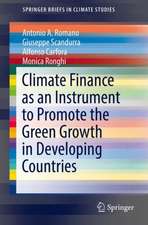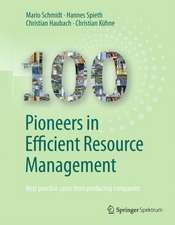Taking Stock of Industrial Ecology
Editat de Roland Clift, Angela Druckmanen Limba Engleză Hardback – 17 dec 2015
Such questions are at the heart of the emerging discipline of industrial ecology, covered in Taking Stock of Industrial Ecology. Leading authors, researchers and practitioners review how far industrial ecology has developed and current issues and concerns, with illustrations of what the industrial ecology paradigm has achieved in public policy, corporate strategy and industrial practice. It provides an introduction for students coming to industrial ecology and for professionals who wish to understand what industrial ecology can offer, a reference for researchers and practitioners and a source of case studies for teachers.
| Toate formatele și edițiile | Preț | Express |
|---|---|---|
| Paperback (1) | 376.54 lei 39-44 zile | |
| Springer International Publishing – 27 mar 2019 | 376.54 lei 39-44 zile | |
| Hardback (1) | 441.19 lei 3-5 săpt. | |
| Springer International Publishing – 17 dec 2015 | 441.19 lei 3-5 săpt. |
Preț: 441.19 lei
Nou
Puncte Express: 662
Preț estimativ în valută:
84.42€ • 87.09$ • 70.45£
84.42€ • 87.09$ • 70.45£
Carte disponibilă
Livrare economică 06-20 martie
Preluare comenzi: 021 569.72.76
Specificații
ISBN-13: 9783319205700
ISBN-10: 3319205706
Pagini: 400
Ilustrații: XXI, 362 p. 43 illus., 34 illus. in color.
Dimensiuni: 155 x 235 x 21 mm
Greutate: 0.89 kg
Ediția:1st ed. 2016
Editura: Springer International Publishing
Colecția Springer
Locul publicării:Cham, Switzerland
ISBN-10: 3319205706
Pagini: 400
Ilustrații: XXI, 362 p. 43 illus., 34 illus. in color.
Dimensiuni: 155 x 235 x 21 mm
Greutate: 0.89 kg
Ediția:1st ed. 2016
Editura: Springer International Publishing
Colecția Springer
Locul publicării:Cham, Switzerland
Public țintă
ResearchCuprins
Introduction.- General reflections.- The Price of Everything and the Value of Nothing: sustainability ‘after the crisis’.- Impacts of global trade flows.- Stocks and flows in the performance economy.- The Embeddedness of carbon in UK Lifestyles.- Ethics of Industrial Ecology.- Complexity and prediction.- Urban metabolism.- Industrial Symbiosis.- Industrial Ecology and the Solidarity Economy.- Industrial Ecology in Developing Countries.- Material Flow Analysis and Waste Management.- Social sciences in Industrial Ecology.- Life Cycle Sustainability Assessment.- Prospective Models of Society’s Future Metabolism.- Planetary boundaries and sustainable business.- Working with policymakers.- Portugal’s national waste plan.- The Industrial Ecology of the automobile.
Textul de pe ultima copertă
How can we design more sustainable industrial and urban systems that reduce environmental impacts while supporting a high quality of life for everyone? What progress has been made towards reducing resource use and waste, and what are the prospects for more resilient material-efficient economies? What are the environmental and social impacts of global supply chains, and how can they be measured and improved?
Such questions are at the heart of the emerging discipline of industrial ecology, covered in Taking Stock of Industrial Ecology. Leading authors, researchers and practitioners review how far industrial ecology has developed and current issues and concerns, with illustrations of what the industrial ecology paradigm has achieved in public policy, corporate strategy and industrial practice. It provides an introduction for students coming to industrial ecology and for professionals who wish to understand what industrial ecology can offer, a reference for researchers and practitioners, and a source of case studies for teachers.
Such questions are at the heart of the emerging discipline of industrial ecology, covered in Taking Stock of Industrial Ecology. Leading authors, researchers and practitioners review how far industrial ecology has developed and current issues and concerns, with illustrations of what the industrial ecology paradigm has achieved in public policy, corporate strategy and industrial practice. It provides an introduction for students coming to industrial ecology and for professionals who wish to understand what industrial ecology can offer, a reference for researchers and practitioners, and a source of case studies for teachers.
Caracteristici
Includes state-of-the-art and state-of-the-practice chapters, including case studies, by leading authorities
Reviews how far industrial ecology has developed and the current issues and concerns
Provides illustrations of what the industrial ecology paradigm has achieved in public policy, corporate strategy and industrial practice
Reviews how far industrial ecology has developed and the current issues and concerns
Provides illustrations of what the industrial ecology paradigm has achieved in public policy, corporate strategy and industrial practice


























